

Candide: Themes, Motifs & Symbols. Themes Themes are the fundamental and often universal ideas explored in a literary work.

The Folly of Optimism Pangloss and his student Candide maintain that “everything is for the best in this best of all possible worlds.” This idea is a reductively simplified version of the philosophies of a number of Enlightenment thinkers, most notably Gottfried Wilhelm von Leibniz. To these thinkers, the existence of any evil in the world would have to be a sign that God is either not entirely good or not all-powerful, and the idea of an imperfect God is nonsensical. The Uselessness of Philosophical Speculation One of the most glaring flaws of Pangloss’s optimism is that it is based on abstract philosophical argument rather than real-world evidence. Candide. Candide, ou l'Optimisme (/ˌkænˈdiːd/; French: [kɑ̃did]) is a French satire first published in 1759 by Voltaire, a philosopher of the Age of Enlightenment.
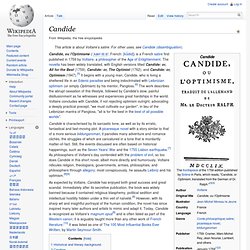
The novella has been widely translated, with English versions titled Candide: or, All for the Best (1759); Candide: or, The Optimist (1762); and Candide: or, Optimism (1947).[5] It begins with a young man, Candide, who is living a sheltered life in an Edenic paradise and being indoctrinated with Leibnizian optimism (or simply Optimism) by his mentor, Pangloss.[6] The work describes the abrupt cessation of this lifestyle, followed by Candide's slow, painful disillusionment as he witnesses and experiences great hardships in the world.
Candide: Plot Overview. Candide is the illegitimate nephew of a German baron.

Candide. Adam and Eve by sary56, August 20, 2013 "Moreover, in the Garden of Eden Adam and Eve enjoyed the fruits of nature without having to work...
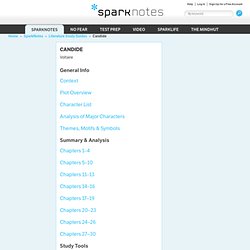
" I don't think that's true. Genesis 2:15 says, "The LORD God took the man and put him in the garden of Eden to work it and keep it. " Adam's purpose was to work even before the fall, which happens in Genesis 3. Life life by Jekemi, January 05, 2014 What I got from this book is that whether Panglos is right or not. I believe that in the end Candide gave up on arguing - he simply realised the pointlessness of doing it and that true happiness will be by living life without thinking about it the whole time. Thanks for your post.
Jacques. Author and Philosopher. Francois Marie Arouet (pen name Voltaire) was born on November 21, 1694 in Paris.
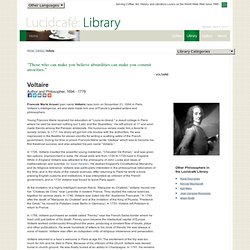
Voltaire’s intelligence, wit and style made him one of France’s greatest writers and philosophers. Young Francois Marie received his education at “Louis-le-Grand,” a Jesuit college in Paris where he said he learned nothing but “Latin and the Stupidities.” He left school at 17 and soon made friends among the Parisian aristocrats. His humorous verses made him a favorite in society circles. In 1717, his sharp wit got him into trouble with the authorities. In 1726, Voltaire insulted the powerful young nobleman, “Chevalier De Rohan,” and was given two options: imprisonment or exile.
At the invitation of a highly-intelligent woman friend, “Marquise du Chatelet,” Voltaire moved into her “Chateau de Cirey” near Luneville in eastern France. In 1759, Voltaire purchased an estate called “Ferney” near the French-Swiss border where he lived until just before of his death. Resource Menu. Voltaire. French writer, satirist, the embodiment of the 18th-century Enlightenment.
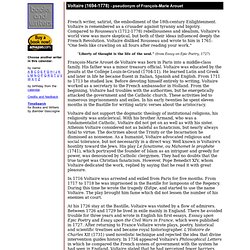
Voltaire is remembered as a crusader against tyranny and bigotry. Compared to Rousseau's (1712-1778) rebelliousness and idealism, Voltaire's world view was more skeptical, but both of their ideas influenced deeply the French Revolution. Voltaire disliked Rousseau and wrote to him in 1761: "One feels like crawling on all fours after reading your work. " "Liberty of thought is the life of the soul.
" (from Essay on Epic Poetry, 1727) François-Marie Arouet de Voltaire was born in Paris into a middle-class family. Voltaire. French writer, historian and philosopher François-Marie Arouet (French: [fʁɑ̃swa maʁi aʁwɛ]; 21 November 1694 – 30 May 1778), known by his nom de plume Voltaire (;[5][6][7] also ,[8][9] French: [vɔltɛːʁ]), was a French Enlightenment writer, historian, and philosopher famous for his wit, his criticism of Christianity—especially the Roman Catholic Church—as well as his advocacy of freedom of speech, freedom of religion, and separation of church and state.
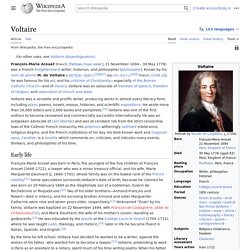
Biography François-Marie Arouet was born in Paris, the youngest of the five children of François Arouet (1649–1722), a lawyer who was a minor treasury official, and his wife, Marie Marguerite Daumard (c. 1660–1701), whose family was on the lowest rank of the French nobility. Some speculation surrounds Voltaire's date of birth, because he claimed he was born on 20 February 1694 as the illegitimate son of a nobleman, Guérin de Rochebrune or Roquebrune. He mainly argued for religious tolerance and freedom of thought. Name Early fiction Prussia. Voltaire.